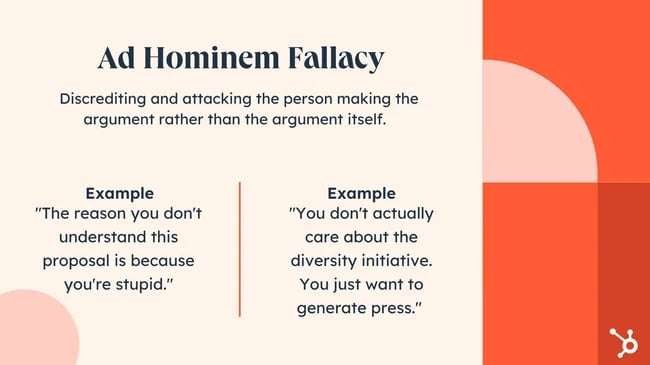You might have been swayed away by any argument that seemed logically convincing but left you uneasy. This is where you have fallen victim to logical fallacy. These intrigues or deceptive reasoning or logical fallacies patterns are sneaky dragons in the debate or argument kingdom, disguised as truth but, in reality, breathing fire in the pattern of ambiguous claims.
At the end of the blog, you will be able to identify those confusing dragons and become master of identifying logical fallacies during communication.
What are Logical Fallacies?
“Logical fallacies are inaccuracies in the line of thought that incapacitates argument’s justifiability.” They often base upon emotional manipulations or spurious pattern rather than sound logic and evidence to prove the thought. They are widely used to get one’s work done without much effort.
Tired of Being a Doormat? Here’s the Guaranteed Way to Finally Get What You Deserve!
Examples of Common Fallacies:
-
Ad Hominem: Targeting the person building the argument instead of their line of thoughts.
- “You only want stricter gun control because you’re afraid of guns!” (Focuses on the speaker’s fear, not the merits of gun control.)
-
Appeal to Emotion: Provoking emotions to cloud judgment and receive acceptance.
- “If you don’t advocate this charity, you don’t care about sick children!” (Plays on sympathy to evade discussing the effectiveness and cruciality of the charity.)
-
Feeble Argument: Misrepresenting an opponent’s argument to make it simple and feasible to wreck it.
- “You’re calling all technology is harmful for kids! We require technology in education!” (Exaggerates the opponent’s position to make it seem extreme.)
-
Slippery Slope: Suggesting a small step will lead to a disastrous outcome, often with little evidence.
- “If we decriminalize marijuana, people will begin using extreme drugs!” (Doesn’t consider regulations or evidence from places with legalized marijuana.)
How to Detect Fallacies:

-
Take break and Analyze: Don’t get swept away by emotional tone but remain firm in your argument unless proven wrong evidently. Take time to destabilize the argument to build your pattern of thought.
-
Identify the Underlying Reasoning: Raise question to yourself, “Does the evidence logically support the conclusion?” By this question, your brain will respond impartially. Don’t hurry to make decision, somethings take time to decipher and unlock the concealed thoughts underlined within them mysteriously.
-
Look for Emotional Manipulation: Be vigilant of language that hits fear, pity, or aggression to distract from the logic. Understanding the core of thought and the tone of the speaker, you can decipher their manipulation at the very early level of conversation.
Forget Everything! Moula Ali’s Powerful Words Will Transform Your Self-Image (Guaranteed!)
-
Always Check Facts: Don’t depend entirely on the information displayed in the argument. Verify facts with reliable sources of information. Consolidate your ideas and don’t allow your confidence to shatter, results can be terrifying if you lost the morale and falling drastically into the opponent’s trap.
Why Should You Detect Fallacies?
By deciphering reasoning fallacies, you will be able to gain several qualities in your personality:
-
Become a More Critically Educated Citizen: Evaluate thoughts deeply and reach their core concept before building your narrative. This will help you evaluate multifarious things running in your society at another level. You can identify fallacies in the system branched into different facets.
-
Make Sound Decisions: Be confident and vigilant to avoid being misled by emotions or manipulations but faulty reasoning. People tend to gain profits or emotional support at the cost someone’s loss.
-
Muscle Your Own Line of Thoughts: Learn to build vivid and logically sound arguments. Read more books on personality development and critically thinking and scrutinize your knowledge practically in your environment to receive perplexing results.
Conclusion
Deciphering logical fallacies empowers and encourages you to plan the world of arguments with brutal confidence. By killing these deceptive bees, you can ensure that your critical reasoning, and the evaluation of others, is established on a foundation of rationality and verification. So, develop your critical thinking abilities, and participate in the race for transparent and fact-based conversation!

